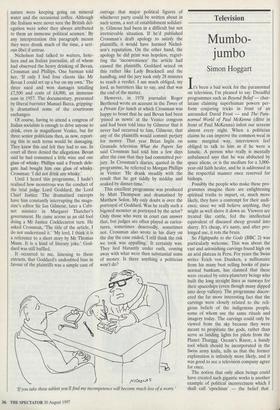Radio
Lies, damned lies . . .
Michael Vestey
Whenever I reported on politics for the BBC I always liked to think that politi- cians were intrinsically decent people who in order to survive in a carnivorous world fell back on baser instincts. I was not con- vinced this was the case, but felt I had to go along with it. Recent exposure of their real habits indicate to me that all is not well in the British political system.
I reflect on this having heard a fascinat- ing documentary on Radio Four this week, Libel, They Filled Themselves like Tanks with Whiskey (Friday) involving The Specta- tor of 40 years ago. In 1957 the magazine ran an article by a political journalist, Jenny Nicholson, with the headline 'Death in Venice'. It was about the 23rd annual congress of the Italian Socialist Party attended by a British Labour delegation comprising the former minister Aneurin Bevan, the future Cabinet minister Richard Crossman and Morgan Phillips, the party's general secretary.
In what was meant to be a satirical piece, Nicholson wrote that Bevan, Crossman and Phillips 'puzzled the Italians by their capac- ity to fill themselves like tanks with whiskey and coffee while they, because of their liv- ers and because they were abstemious by nature were keeping going on mineral water and the occasional coffee. Although the Italians were never sure the British del- egation were sober they always attributed to them an immense political acumen.' By any interpretation this paragraph means they were drunk much of the time, a seri- ous libel if untrue.
Nicholson had talked to waiters, hote- liers and an Italian journalist, all of whom had observed the heavy drinking of Bevan, Crossman and Phillips. One barman told her, 'If only I had four clients like Mr Bevan I could set up a bar on my own.' The three sued and won damages totalling £7,500 and costs of £4,000, an immense sum in 1957. The documentary, presented by liberal barrister Manuel Barca, gripping- ly dramatised some of the courtroom exchanges.
Of course, having to attend a congress of Italian socialists is enough to drive anyone to drink, even in magnificent Venice, but for three senior politicians then, as now, report- ing this in such terms would be damaging. They knew this and felt they had to sue. In court all three denied the allegations. Bevan said he had consumed a little wine and one glass of whisky. Phillips said a French dele- gate had bought him one glass of whisky. Crossman: 'I did not drink any whisky.'
Until I heard this programme, I hadn't realised how monstrous was the conduct of the trial judge Lord Goddard, the Lord Chief Justice. The dramatised excerpts have him constantly interrupting the maga- zine's editor Sir Ian Gilmour, later a Cabi- net minister in Margaret Thatcher's government. He came across as an old fool doing a Mr Justice Cocklecarrot turn. He asked Crossman, 'The title of the article, I do not understand it.' My lord, I think it is a reference to a short story by Mr Thomas Mann. It is a kind of literary joke.' God- dard was still baffled.
It occurred to me, listening to these extracts, that Goddard's undoubted bias in favour of the plaintiffs was a simple case of outrage that major political figures of whichever party could be written about in such terms, a sort of establishment solidari ty. Gilmour had been in a difficult but not irretrievable situation. If he'd published Crossman's draft apology to satisfy the plaintiffs, it would have harmed Nichol- son's reputation. On the other hand, the apology he did print was hopeless, regret- ting the 'inconvenience' the article had caused the plaintiffs. Goddard seized on this rather like Lady Bracknell and the handbag, and the jury took only 28 minutes to reach a verdict. I am much obliged, my lord, as barristers like to say, and that was the end of the matter.
However, in 1978 journalist Roger Berthoud wrote an account in the Times of a Private Eye lunch at which Crossman was happy to boast that he and Bevan had been `pissed as newts' at the Venice congress and had been told later by Gilmour that it never had occurred to him, Gilmour, that any of the plaintiffs would commit perjury for money. That year Brian Inglis on Granada television What the Papers Say said Crossman had told him a few days after the case that they had committed per- jury. In Crossman's diaries, quoted in the programme, he referred to Morgan Phillips in Venice: 'He drank steadily with the result that he got tiddly by midday and soaked by dinner-time.'
This excellent programme was produced by Matt Thompson and dramatised by Matthew Solon. My only doubt is over the portrayal of Goddard. Was he really such a bigoted monster as portrayed by the actor? Only those who were in court can answer that, but judges are often played as carica- tures, sometimes deservedly, sometimes not. Crossman also wrote in his diary on the day the case ended, 'I still think the risk we took was appalling.' It certainly was. They lied blatantly under oath, coming away with what were then substantial sums of money. Is there anything a politician won't do?
`If you take these tablets you'll find my incompetence will become much less of a worry.'



















































 Previous page
Previous page